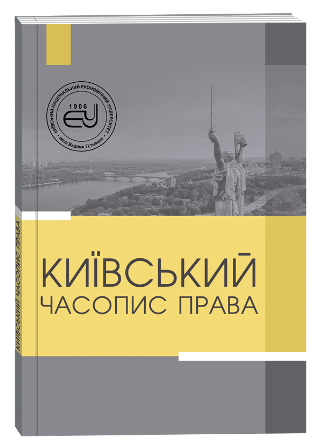INSTITUTIONAL AND LEGAL DETERMINANTS OF EVIDENCE FORMATION BY AN ATTORNEY IN CRIMINAL PROCEEDINGS
DOI:
https://doi.org/10.32782/klj/2025.1.22Keywords:
defense counsel, evidentiary base, criminal proceedings, evidentiary process, adversariality, admissibility of evidence, attorney-led investigation, judicial practice, international standards, electronic evidence, OSINT, criminal analysisAbstract
The article explores the institutional and legal determinants of evidence formation by a defense counsel in criminal proceedings. The study analyzes the regulatory framework governing the evidentiary activities of the defense, examining its procedural capabilities and limitations in collecting and presenting evidence. Doctrinal approaches to defining the role of a defense attorney in proving and establishing the circumstances of a criminal case are highlighted. The adversarial nature of criminal proceedings is considered a key principle that ensures a balance between the parties and provides defense counsel with procedural tools for active participation in the evidentiary process.Particular attention is given to analyzing the legal mechanisms available for obtaining evidence by the defense, including the right to request documents, conduct attorney-led investigations, engage experts and specialists, obtain witness statements, and use modern technologies in the evidentiary process. The article identifies key challenges in exercising the right to gather evidence, including difficulties in accessing specific categories of information, the limited evidentiary tools available to the defense compared to the prosecution, and practical issues concerning the use of evidence obtained by attorneys in court proceedings.The study examines the admissibility and relevance of evidence collected by defense counsel within the context of judicial practice and international criminal procedure standards. A comparative analysis of different legal systems’ approaches to assessing the evidentiary activities of defense counsel is conducted, along with an examination of the influence of the European Court of Human Rights’ case law on expanding the evidentiary capabilities of the legal profession. Special attention is devoted to the legal challenges of recognizing evidence obtained by defense counsel and the procedural safeguards ensuring equality between the parties in criminal proceedings.The article also addresses the role of digital technologies in the evidentiary activities of defense attorneys, particularly the application of OSINT methods. The prospects for the development of evidentiary activities in criminal proceedings are outlined, including improvements in regulatory frameworks, the introduction of new evidentiary mechanisms, the expansion of the defense’s procedural capabilities, and the enhancement of attorney-led investigations. The need for further academic research focused on adapting national legislation to international standards, particularly the recommendations of the European Court of Human Rights and the fundamental principles of criminal justice in EU countries, is emphasized.The article concludes by highlighting the necessity of improving legislative provisions governing defense counsel’s activities in criminal proceedings and developing methodological guidelines for the effective use of the evidentiary base by the defense. Various approaches to enhancing the effectiveness of attorneys’ evidentiary activities are proposed, including strengthening procedural guarantees of adversariality and equality between the parties in criminal proceedings.
References
Баулін О. Поняття доказів у кримінальному процесі. Вісник Національної академії прокуратури України. 2017. № 1 (47). С. 75-81.
Кримінальний процесуальний кодекс України. Кодекс України; Закон, Кодекс від 13.04.2012 р. № 4651-VI. URL: https://zakon.rada.gov.ua/laws/show/4651-17#Text
Коваленко Є.Г. Теорія доказів у кримінальному процесі України: підручник. К.: Юрінком Інтер, 2006. 632 с.
Крушинський С.А. Подання доказів у кримінальному судочинстві України: монографія. Хмельницький: ХУУП, 2017. 247 с.
Стоянов М.М. Властивості доказів у кримінальному процесі України: автореф. дис. … канд. юрид. наук: 12.00.09. Одеса, 2010. 20 с.
Погорецький М. Теорія кримінального процесуального доказування: проблемні питання. Право України. 2014. № 10. С. 12-25.
Шумило М.Є. Досудові і судові докази у КПК України. Юридичний часопис Національної академії внутрішніх справ. 2013. № 1. С. 82-86.
Погорецький М.А. Докази у кримінальному процесі: проблемні питання. Часопис Національного університету «Острозька академія». Серія «Право». 2011. № 1 (3) С. 1-55.
Биков І.О. Роль кримінального аналізу у забезпеченні національної безпеки. Юридичний науковий електронний журнал. 2024. № 2. С. 676-678. DOI https://doi.org/10.32782/2524-0374/2024-2/167
Биков І.О. Інформаційно-аналітичне забезпечення діяльності слідчих та оперативних підрозділів у боротьбі з економічними злочинами. Право і суспільство. 2024. № 1. Т. 2. С. 392 – 396. DOI https://doi. org/10.32842/2078-3736/2024.1.2.59
Биков І.О., Павлютін Ю.М. Актуальні проблеми забезпечення доказів в адміністративному процесі. Південноукраїнський правничий часопис. 2022. № 4. Ч. 3. С. 245-249. DOI https://doi.org/10.32850/ sulj.2022.4.3.41







